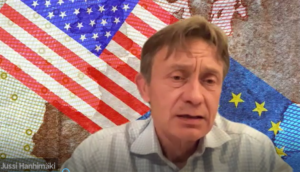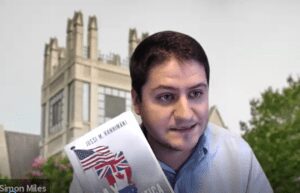

Watch a recording of the event.
Event summary by Jack Kochansky:
On October 12, the Duke Program in American Grand Strategy was joined by Jussi Hanhimäki, a Professor of International History and Finland Distinguished Professor at the Graduate Institute of International and Development Studies in Geneva, Switzerland. In a conversation with Duke Professor Simon Miles, he discussed his new book, Pax Transatlantica. Professor Hanhimäki contended that despite the rise of China, populism, and cyberattacks, we have reason to feel confident in the strength of the European-American alliance.
The conversation began with a discussion of Prof. Hanhimäki’s motivations for writing this book. He expressed a frustration with the “perennial crisis” in transatlantic relationships that the media is so eager to report on, whether it be trade wars or NATO tensions or pandemic stressors. Professor Hanhimäki argued that in the context of a durable political and economic alliance that has endured since the Cold War, these disagreements are not cause for alarm. He highlights that both the EU and US are democratic powerhouses, and democracies are inherently messy.
While stopping short of making an outright prediction, Professor Hanhimäki argued that trends suggest a strengthening, not a weakening, of the transatlantic partnership in the near future. He acknowledged tensions about the relative financial contributions of NATO member countries but contended that these minor disputes are normal — and no major country is seriously considering leaving the military alliance. NATO is particularly strong, he continued, because geopolitical tensions and history makes it difficult for Europe’s superpowers (notably Germany and France) to build up adequate defense systems without American support. While NATO grew out of Cold War desires to resist the Soviet sphere of influence, similar reasoning continues to permeate today.
Professor Miles then shifted the conversation towards the resilience of the economic alliance of the North Atlantic, especially in the face of China’s growing economic prowess. Prof. Hanhimäki acknowledged that China’s growth has been impressive but continued to emphasize the economic integration of the US and Europe. Each of these regions is the other’s largest export market, and the two follow very similar economic trends. There is also heavy investment across the Atlantic – which China is only beginning to enter in earnest.
Finally, Professors Hanhimäki and Miles brought the economic and political components of the discussion together in an exchange about the rise of populism on both sides of the Atlantic. Prof. Hanhimäki pointed out that populism comes and goes in waves, and if anything, its concurrent rise in the US and Europe further exemplifies the two regions’ political interconnectedness. He expects the populist fad to fade — which is further good news for the transatlantic partnership.
The event then opened to audience members for Q&A. Professor Hanhimäki answered questions on everything from Turkey to the geopolitical alternatives to NATO to the rise of populism in the Global South. He expressed confidence in the durability of North Atlantic unity in the near future.

